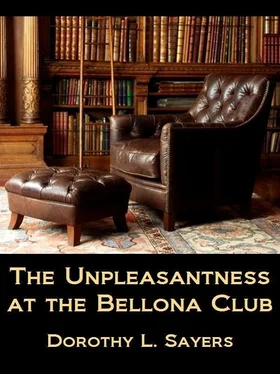The door closed after them, and a tension seemed removed. The circle broke up into groups. Somebody lit a cigarette. The planet’s tyrant, dotard Death, had held his grey mirror before them for a moment and shown them the image of things to come. But now it was taken away again. The unpleasantness had passed. Fortunate, indeed, that Penberthy was the old man’s own doctor. He knew all about it. He could give a certificate. No inquest. Nothing undesirable. The members of the Bellona Club could go to dinner.
Colonel Marchbanks turned to go through the far door towards the library. In a narrow anteroom between the two rooms there was a convenient telephone-cabinet for the use of those members who did not wish to emerge into the semi-publicity of the entrance hall.
“Hi, colonel! not that one. That instrument’s out of order,” said a man called Wetheridge, who saw him go. “Disgraceful, I call it. I wanted to use the ’phone this morning, and — oh! hallo! the notice has gone. I suppose it’s all right again. They ought to let one know.”
Colonel Marchbanks paid little attention to Wetheridge. He was the club grumbler, distinguished even in that fellowship of the dyspeptic and peremptory — always threatening to complain to the Committee, harassing the Secretary and constituting a perennial thorn in the sides of his fellow-members.
He retired, murmuring, to his chair and the evening paper, and the Colonel stepped into the telephone-cabinet to call up Lady Dormer’s house in Portman Square.
Presently he came out through the library into the entrance-hall, and met Penberthy and Wimsey just descending the staircase.
“Have you broken the news to Lady Dormer?” asked Wimsey.
“Lady Dormer is dead,” said the Colonel. “Her maid tells me she passed quietly away at half-past ten this morning.”
Chapter III
Hearts Count More than Diamonds
About ten days after that notable Armistice Day, Lord Peter Wimsey was sitting in his library, reading a rare fourteenth century manuscript of Justinian. It gave him particular pleasure, being embellished with a large number of drawings in sepia, extremely delicate in workmanship, and not always equally so in subject. Beside him on a convenient table stood a long-necked decanter of priceless old port. From time to time he stimulated his interest with a few sips, pursing his lips thoughtfully, and slowly savouring the balmy aftertaste.
A ring at the front-door of the flat caused him to exclaim “Oh, hell!” and cock an attentive ear for the intruder’s voice. Apparently the result was satisfactory, for he closed the Justinian and had assumed a welcoming smile when the door opened.
“Mr. Murbles, my lord.”
The little elderly gentleman who entered was so perfectly the family solicitor as really to have no distinguishing personality at all, beyond a great kindliness of heart and a weakness for soda-mint lozenges.
“I am not disturbing you, I trust, Lord Peter.”
“Good lord, no, sir. Always delighted to see you. Bunter, a glass for Mr. Murbles. Very glad you’ve turned up, sir. The Cockburn ’86 always tastes a lot better in company — discernin’ company, that is. Once knew a fellow who polluted it with a Trichinopoly. He was not asked again. Eight months later, he committed suicide. I don’t say it was on that account. But he was earmarked for a bad end, what?”
“You horrify me,” said Mr. Murbles, gravely. “I have seen many men sent to the gallows for crimes with which I could feel much more sympathy. Thank-you, Bunter, thank-you. You are quite well, I trust?”
“I am in excellent health, I am obliged to you, sir.”
“That’s good. Been doing any photography lately?”
“A certain amount, sir. But merely of a pictorial description, if I may venture to call it so. Criminological material, sir, has been distressingly deficient of late.”
“Perhaps Mr. Murbles has brought us something,” suggested Wimsey.
“No,” said Mr. Murbles, holding the Cockburn ’86 beneath his nostrils and gently agitating the glass to release the ethers, “no, I can’t say I have, precisely. I will not disguise that I have come in the hope of deriving benefit from your trained habits of observation and deduction, but I fear — that is, I trust — in fact, I am confident — that nothing of an undesirable nature is involved. The fact is,” he went on, as the door closed upon the retreating Bunter, “a curious question has arisen with regard to the sad death of General Fentiman at the Bellona Club, to which, I understand, you were a witness.”
“If you understand that, Murbles,” said his lordship, cryptically, “you understand a damn sight more than I do. I did not witness the death — I witnessed the discovery of the death — which is a very different thing, by a long chalk.”
“By how long a chalk?” asked Mr. Murbles, eagerly. “That is just what I am trying to find out.”
“That’s very inquisitive of you,” said Wimsey. “I think perhaps it would be better”—he lifted his glass and tilted it thoughtfully, watching the wine coil down in thin flower-petallings from rim to stem—“if you were to tell me exactly what you want to know… and why. After all… I’m a member of the Club… family associations chiefly, I suppose…but there it is.”
Mr. Murbles looked up sharply, but Wimsey’s attention seemed focussed upon the port.
“Quite so,” said the solicitor. “Very well. The facts of the matter are these. General Fentiman had, as you know, a sister Felicity, twelve years younger than himself. She was very beautiful and very wilful as a girl, and ought to have made a very fine match, but for the fact that the Fentimans, though extremely well-descended, were anything but well-off. As usual at that period, all the money there was went to educating the boy, buying him a commission in a crack regiment and supporting him there in the style which was considered indispensable for a Fentiman. Consequently there was nothing left to furnish a marriage-portion for Felicity, and that was rather disastrous for a young woman sixty years ago.
“Well, Felicity got tired of being dragged through the social round in her darned muslins and gloves that had been to the cleaners — and she had the spirit to resent her mother’s perpetual strategies in the match-making line. There was a dreadful, decrepit old viscount, eaten up with diseases and dissipations, who would have been delighted to totter to the altar with a handsome young creature of eighteen, and I am sorry to say that the girl’s father and mother did everything they could to force her into accepting this disgraceful proposal. In fact, the engagement was announced and the wedding-day fixed, when, to the extreme horror of her family, Felicity calmly informed them one morning that she had gone out before breakfast and actually got married, in the most indecent secrecy and haste, to a middle-aged man called Dormer, very honest and abundantly wealthy, and — horrid to relate — a prosperous manufacturer. Buttons, in fact — made of papier mâché or something, with a patent indestructible shank — were the revolting antecedents to which this headstrong young Victorian had allied herself.
“Naturally there was a terrible scandal, and the parents did their best — seeing that Felicity was a minor — to get the marriage annulled. However, Felicity checkmated their plans pretty effectually by escaping from her bedroom — I fear, indeed, that she actually climbed down a tree in the back-garden, crinoline and all — and running away with her husband. After which, seeing that the worst had happened — indeed, Dormer, a man of prompt action, lost no time in putting his bride in the family way — the old people put the best face they could on it in the grand Victorian manner. That is, they gave their consent to the marriage, forwarded their daughter’s belongings to her new home in Manchester, and forbade her to darken their doors again.”
Читать дальше












